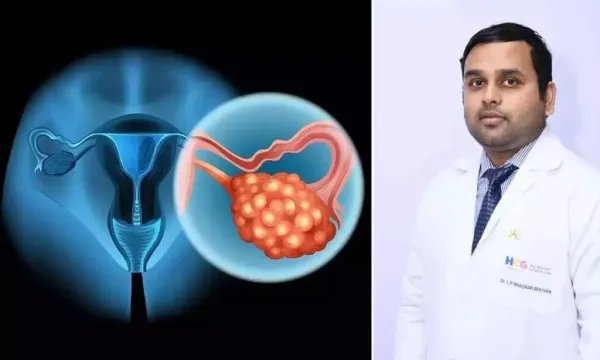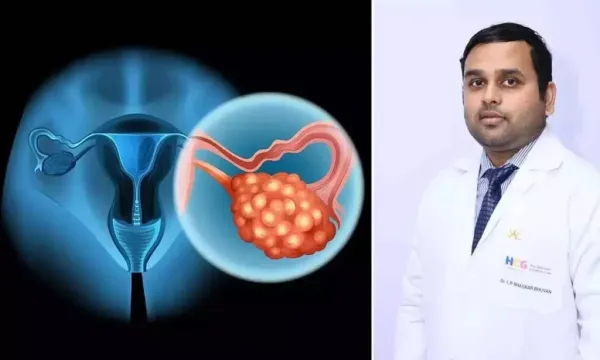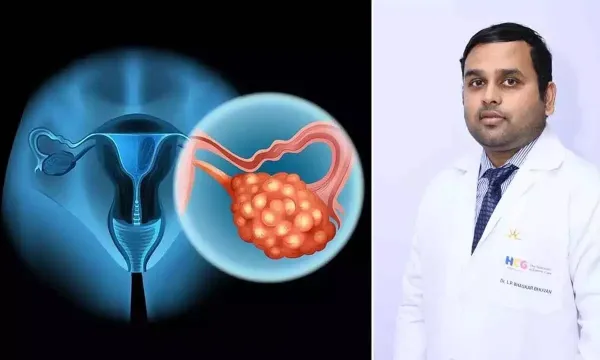

Bengaluru Ovarian cancer is rarely talked about – and that’s the problem. Unlike more obviously disfiguring health conditions, ovarian cancer disguises itself with symptoms that most women ignore, thinking they’re “normal” or “temporary.” Bloating, slight pelvic discomfort, feeling full too quickly or an urgent need to urinate – these may all seem like minor problems. Many women ignore them, attributing them to a heavy meal, a stressful day or even menstrual changes. But when these symptoms persist or increase in intensity, they could be a sign of serious consequences.
The ovaries are small, almond-shaped organs hidden deep in the abdomen. When cancer develops here, it gets a lot of room to grow without anyone noticing. By the time the symptoms become so obvious that they cannot be ignored, the disease has already spread beyond the ovaries. Thus, awareness not only becomes crucial – but can also be potentially life-saving. Recognising the symptoms: When should you be worried? Also Read – US researchers identify high-risk cells that can trigger ovarian cancer The fact that ovarian cancer symptoms mimic those of more common and less dangerous conditions is the reason why these tend to be overlooked. However, women should take frequent recurrence of symptoms seriously and seek medical consultation immediately.
Persistent bloating, feeling full quickly while eating, frequent urination, lower back pain or pelvic discomfort, fatigue for no apparent reason, and sudden changes in the menstrual cycle should all be investigated. Also Read – US researchers decode the origins of ovarian cancer Advertisement Listening to your body is your first line of defence. Risk factors: Could you be at higher risk? Understanding risk doesn’t mean living in fear – it means being better prepared. Some women are more likely to develop ovarian cancer due to a combination of lifestyle, hormonal, and hereditary factors. One thing to consider is age, especially after menopause. But younger women are not immune. A family history of ovarian or breast cancer, as well as genetic abnormalities, can all increase vulnerability. Women who have never been pregnant, have taken hormone replacement therapy for a long time, or have undergone specific reproductive procedures may be at higher risk. Starting menstruation at a very young age or experiencing menopause late can also increase the risk. However, the presence of risk factors does not suggest that cancer will definitely occur. They only advocate more active screening and being alert to any unexpected changes in the body.
Role of Indian lifestyle and cultural habits
In India, there is a cultural pattern of women prioritising their families, often at the expense of their own health. The concept of “adjusting” is deeply rooted, and it is not uncommon for women to endure pain or discomfort silently. Many put off regular gynaecological check-ups due to modesty or lack of time. However, what is usually considered a strength can become a weakness when it delays discovery and treatment. Furthermore, access to specialised healthcare options for women varies in urban and rural areas. Many symptoms are not reported because people do not know about them or fear stigmatisation. Therefore, public discussion is vital, especially in the context of conservative Indian culture, and should ideally be conducted in the local language.
What can be done: Awareness is the first step.
Empowerment starts with information. Knowing what to look for puts the power in your hands. Don’t wait until symptoms become unbearable before seeking treatment. Regular health checkups should be a priority. Ask questions. Discuss family medical history. Pay attention to subtle changes in your health. And most importantly, talk about these issues. Whether it’s with your mother, sister, daughter or friend – open conversations about women’s health break the silence on which diseases like ovarian cancer thrive.
Prevention isn’t always possible, but taking action in time is powerful.
Ovarian cancer cannot be completely prevented, but early detection can make a huge difference. Women with a family history of cancer may be advised to have regular ultrasounds or special blood tests as a precaution. A healthy lifestyle promotes general health. Regular exercise, a diet rich in fruits and vegetables, staying hydrated and maintaining a healthy weight cannot eliminate the risk, but they improve your body’s ability to fight.
Your health is not a secondary issue; it is the basis for everything else. Too often, women ignore signs of discomfort, attribute it to stress, or simply move on because there is always something else that demands their attention. But pay attention


